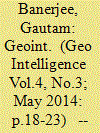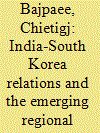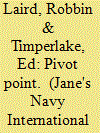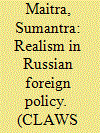|
|
|
Sort Order |
|
|
|
Items / Page
|
|
|
|
|
|
|
| Srl | Item |
| 1 |
ID:
130879


|
|
|
|
|
| Publication |
2014.
|
| Summary/Abstract |
Combat, by its very definition, is an event extra-ordinarily excruciating. It is an ultimate condition that is distinguishable by its phenomenal characteristics which demand, among other undertakings, absolute perfection in marshalling the diverse elements of combat that constitute a military force, for example, troops, firepower, mobility and intelligence. Thus down the ages, 'Great Captains' of war have articulated their strategic intellect to secure victory, irrespective of the bulk of forces, by the best orchestration of the resources under their command. In modern times, developments in 'Information Warfare' have raised the bar of such Terrain intelligence has always been important for winning a battle. In this aricle, the writer advocates establishing a repository of battle-space geographic information called Military Geospatial Intelligence System (MGIS) orchestration to such a high level that it becomes possible to exploit to the hilt the individual capabilities of each element of the military machine. More importantly, it is possible now to seamlessly integrate all such diverse force-elements into one whole system of war-fighting. Military intelligence - terrestrial, strategic and tactical - has always been the most decisive factor in application of combat power as well as an enabling tool for the aforementioned 'best' orchestration of military resources. Within its overall ambit, terrain intelligence - geospatial intelligence in the wider sense as we understand today - has been the pivot of strategic, operational and tactical decision making. In the contemporary period of technological explosion, that pivot has assumed unlimited scope for articulation. At the crosshairs of ever-adversarial forces across terrains of unique descriptions, institution of an efficient mechanism for harnessing the properties of geospatial intelligence - MGIS - must, therefore, be a top priority for India. However, to be really effective, that endeavour has to be tailored to Indian conditions and backed up with indigenous competences; the scope and coverage of GIS as propounded by the lead militaries of the world, USA, China, NATO and Russia, is neither accessible nor sustainable and may not even be necessary in the context of India's technical-industrial-fiscal capacity, and inter alia, her military objectives.
|
|
|
|
|
|
|
|
|
|
|
|
|
|
|
|
| 2 |
ID:
133598


|
|
|
|
|
| Publication |
2014.
|
| Summary/Abstract |
South Korean president Park Geun-hye visited India in January 2014 after India and South Korea marked 40 years of diplomatic relations the previous year.1 These developments symbolise a burgeoning relationship between two of Asia's leading economies and democracies. However, they have added significance as Asia undergoes a shift in the strategic balance of power. This has been prompted by the US rebalance or strategic pivot towards Asia, the rise of China and its proclivity to adopt a more assertive position on regional issues, and the emergence of the 'Indo-Pacific' as a new geopolitical frame of reference. In this context, rising Asian powers such as India and South Korea hold an increasingly significant place in meeting the region's development and security objectives.
|
|
|
|
|
|
|
|
|
|
|
|
|
|
|
|
| 3 |
ID:
125642


|
|
|
|
|
| Publication |
2013.
|
| Summary/Abstract |
The strategic pivot toward the Asia-Pacific region is intended to rebalance the projection and focus of US military power in the years ahead. However, it will not be without its challenges.
|
|
|
|
|
|
|
|
|
|
|
|
|
|
|
|
| 4 |
ID:
131030


|
|
|
|
|
| Publication |
2014.
|
| Summary/Abstract |
The Crimean crisis marks a pivotal point in the rations between Russia and the West. The revolution in Ukraine, and the subsequent events that unfolded at breakneck pace, including the annexation of Crimea by Russia, throws up a lot of questions, the answers to which will have a massive impact on foreign policy and inter-state relations in the future. It also throws up some broad patterns. The crisis is a worrying return to a trend of land annexation by a great power on a pretext, a trend which was thought to be long dead Munich Conference of 2007. It brings back the debate on the concepts of "Perception and Resolve" in foreign policy. And, perhaps, most importantly, it serves as a vindication of realists over the liberals, constructivists and other paradigms of international relations, and validates the often discussed idea that state interests triumph over every other aspect.
|
|
|
|
|
|
|
|
|
|
|
|
|
|
|
|
|
|
|
|
|